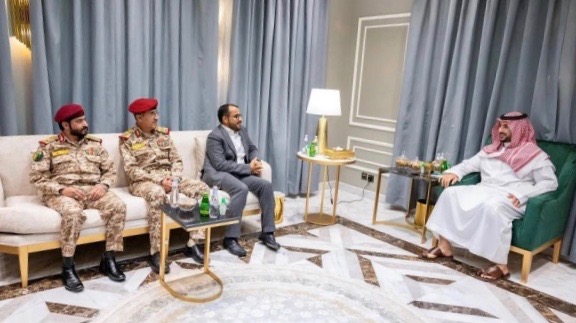Houthi leader and head of the Supreme Political Council in Yemen, Mahdi al-Mashat, welcomed the direct talks with Saudi Arabia on Wednesday, September 20. These are the first direct talks being held between a Houthi delegation and Saudi Arabia since the beginning of the war in Yemen in 2015.
The Yemeni delegation visited Saudi Arabia for five days and met with Saudi Defense Minister Khalid bin Salman before returning to Sanaa on Tuesday.
Previous talks between Saudi Arabia and the Houthis were carried out indirectly in Oman. Al-Mashat thanked Oman for the initiative.
According to reports, some progress was made on the main sticking points between the Ansar Allah (Houthi)-led government in Sanaa and the Saudis, including on the issue of lifting the blockade on the Sanaa airport as well as ports under Houthi control, the payment of salaries of government employees, and withdrawal of all foreign troops from the country.
The Saudi Arabia-led international coalition has imposed a comprehensive land, air, and sea blockade on Yemen since 2015, which has caused massive humanitarian suffering to millions of people. The refusal of Saudi Arabia to lift the blockade was cited by the Houthis as one of the reasons for withdrawing from the ceasefire agreement in October. The agreement was first signed in April last year.
The Houthis have also been demanding that the Saudi-led coalition either pay the pending salaries of government employees in Yemen or share the revenues from the country’s oil exports as it controls them.
UN envoy to Yemen Hans Grundberg has welcomed the talks. Notably, this is the first round of talks being held without the presence of a UN representative.
Humanitarian situation in Yemen
According to Mohammad Abdul Salam, head of the Houthi delegation, the focus of the talks in Saudi Arabia was the humanitarian situation in Yemen. Due to the war and blockade, Yemen was declared as one of the “worst humanitarian” crises ever by the UN.
The majority of the population lives in poverty with minimum or no civil services. Over 17 million Yemenis are food insecure and heavily dependent on aid provided by the UN or other agencies. The situation has deteriorated further after some UN agencies announced a cut in their activities earlier this year citing lack of funds.
Meanwhile, the Houthis have objected to what they call Saudi attempts to play a mediating role in the proposed talks between Yemeni groups. The Sanaa administration made it clear that they do not see Saudi Arabia as a mediator and consider it an aggressor. The Houthis also demanded that the Saudis withdraw their forces from Yemen for the talks to succeed.
In a tweet on Wednesday, Saudi Defense Minister Khalid bin Salman expressed hope that the “Yemeni parties will unite to achieve sustainable development, political stability, and lasting security, enabling Yemen to integrate into the progress and development witnessed within the GCC.”





